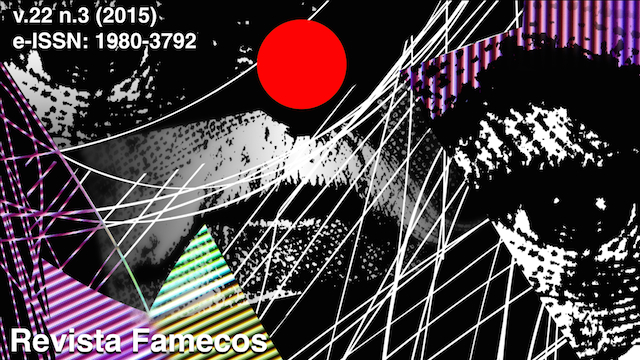“HUEHUEHUE eu sou BR”: spam, trolling y griefing en los juegos online
DOI:
https://doi.org/10.15448/1980-3729.2015.3.19302Palabras clave:
HUE, Brasileño, TrollResumen
El artículo trata de la reputación de agresividad de los brasileños en juegos multiplayer online. Para discutir este tema, las acciones de un determinado grupo de jugadores y su asociación con Brasil son descritas y, a continuación, discutidas conforme las tres categorías en que la literatura pre-existente acostumbra entender el comportamiento tóxico en ambientes online: el envío de spam, el trolling, y el griefing. Se concluye que la agresividad en los juegos multiplayer en Internet no es privilegio de los brasileños y que sus acciones no constituyen novedad en el escenario general del Internet. Por otro lado, las singularidades de su modo de actuar diferencian a los brasileños de los jugadores de otras nacionalidades.
Descargas
Citas
ACHTERBOSCH, Leigh; MILLER, Charllyn e VAMPLEW, Peter. Ganking, Corpse Camping and Ninja Looting from the perception of the MMORPG community: Acceptable Behavior or Unacceptable Griefing? IE'2013, 30/09-01/10/2013, Melbourne, Australia
DOI: 10.1145/2513002.2513007 Acesso em: 25 jan. 2014.
BAKHTIN, Mikhail. A cultura popular na idade média e no renascimento: o contexto de François Rabelais. Brasília: Edunb/Hucitec, 1996.
CGI, Comitê Gestor da Internet no Brasil. Pesquisa sobre o uso das tecnologias de informação e comunicação no Brasil: TIC Domicílios e Empresas 2012. Comitê Gestor da Internet no Brasil, 2013.
CHEN, Vivian H-H; DUH, Henry B-L e NG, Chiew W. Players Who Play to Make Others Cry: The Influence of Anonymity and Immersion. Ace 2009 International Conference on Advances in Computer Entertainment Technology. 29-31 out. 2009, Atenas/Grécia.
DOI: 10.1145/1690388.1690454 Acesso em: 23 jan. 2014.
DIBBELL, Julian. Mutilated Furries, Flying Phalluses: put the blame on griefers, the sociopaths of the virtual world. Wired Magazine 16/02. Disponúivel em: http://www.wired.com/print/gaming/virtualworlds/magazine/16-02/mf_goons Acesso em: 23 jan. 2014.
DONATH, Judith S. Identity and deception in the virtual community. In: Kollock, P. and Smith, M. (Orgs). Communities in Cyberspace. Routledge, 1998.
FOO, Chek Y. e KOIVISTO, E. M. I. Defining Grief Play. In: MMORPGs: Player and Developer Perceptions. ACE 2004 International Conference on Advances in Computer Entertainment Technology, 3-5 jun. 2004, Singapura.
DOI: 10.1145/1067343.1067375 Acesso em: 22 jan. 2014.
HERRING, Susan et al. Searching for Safety Online: Managing “Trolling” in a Feminist Forum The Information Society, 18, p. 371 -384, 2002.
DOI: 10.1080/ 01972240290108186 Acesso em: 25 jan. 2014.
HESS, E. Yib's Guide to Mooing: Getting the Most from Virtual Communities on the Internet. Trafford Publishing, 2003.
IBOPE Brasil é o terceiro país em número de usuários ativos na internet, 19 fev. 2013. Disponível em: http://www.ibope.com.br/pt-br/noticias/Paginas/Brasil-e-o-terceiro-pais-em-numero-de-usuarios-ativos-na-internet.aspx Acesso em: julho de 2014.
IBOPE Novo recorde de navegação no acesso residencial da Internet no Brasil, 4 jan. 2006. Disponível em: http://www.ibope.com.br/pt-br/noticias/Paginas/Novo recorde de navegação no acesso residencial da Internet no Brasil.aspx Acesso em: 14 maio 2006.
KAHNEY, L (2003) Fotolog: Where Art Meets T&A. Wired Magazine, 6/09/2003. Disponível em: http://www.wired.com/culture/lifestyle/news/2003/06/59149?currentPage=all Acesso em: 13 jan. 2014.
MORRISEY, Lochlan. Trolling is a art: Towards a schematic classification of intention in internet trolling Griffith Working Papers in Pragmatics and Intercultural Communication 3, 2, p. 75-82, 2010.
RECUERO, Raquel e SOARES, Pricila. Violência simbólica e redes sociais no facebook: o caso da fanpage“Diva Depressão”. Galaxia, 26, p. 239-254, dez. 2013. Disponível em: http://revistas.pucsp.br/index.php/galaxia/article/view/14478 Acesso em: 22 jul. 2014.
RUVOLO, Julie. Why Brazil Is Actually Winning The Internet. Buzzfeed, BuzzReads, 29/06/2014. Disponível em: http://www.buzzfeed.com/jruv/why-brazil-is-actually-winning-the-internet Acesso em: 13 jul. 2014.
SHACHAF, Pnin e HARA, Noriko. Beyond vandalism: Wikipedia trolls. Journal of Information Science, 36(3), p. 357-370, 2010.
SILVA, J. G. B. Top Ten Reasons orkut is Popular in Brazil, Orkut News, 23/02/2005. Disponível em: http://media.orkut.com/articles/0109.html Acesso em: 12 dez. 2005.
STIVALE, Charles J. Spam: Heteroglossia and Harassment in Cyberspace. In: Porter, D. (org.) Internet Culture. Routledge, p. 133-144, 1997.
SULER, John. Psychology of Cyberspace, 2005. Disponível em: http://www-usr.rider.edu/~suler/psycyber/disinhibit.html Acesso em: 24 jul. 2014.
WILSON, Deirdre e SPERBER, Dan. Teoria da Relevância. Linguagem em Discurso, 5, 2005. Disponível em: http://portaldeperiodicos.unisul.br/index.php/Linguagem_Discurso/article/view/287/301 Acesso em: 19 fev. 2014.
Descargas
Publicado
Cómo citar
Número
Sección
Licencia
Derechos de Autor
La sumisión de originales para la Revista Famecos implica la transferencia, por los autores, de los derechos de publicación. El copyright de los artículos de esta revista es el autor, junto con los derechos de la revista a la primera publicación. Los autores sólo podrán utilizar los mismos resultados en otras publicaciones indicando claramente a Revista Famecos como el medio de la publicación original.
Creative Commons License
Excepto donde especificado de modo diferente, se aplican a la materia publicada en este periódico los términos de una licencia Creative Commons Atribución 4.0 Internacional, que permite el uso irrestricto, la distribución y la reproducción en cualquier medio siempre y cuando la publicación original sea correctamente citada.






